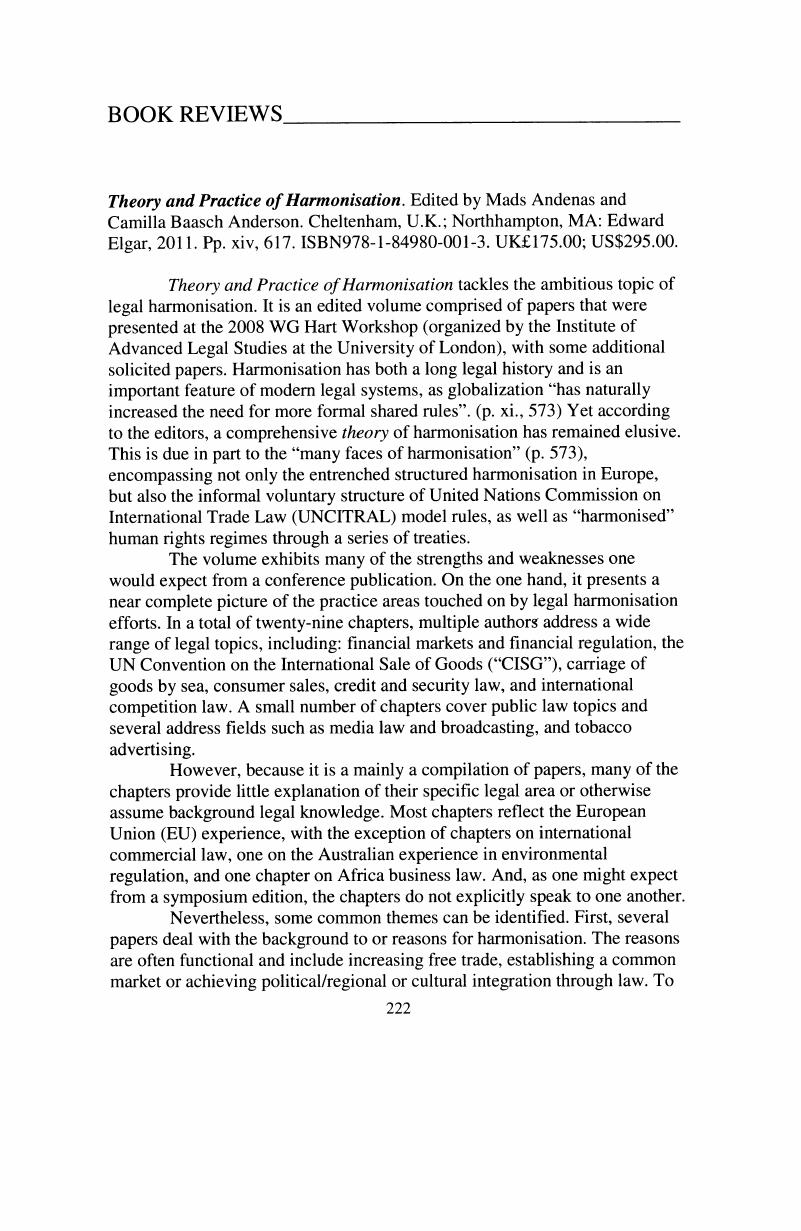No CrossRef data available.
Published online by Cambridge University Press: 28 February 2019

1 But compare with Stelios Andreadakis, who, in Ch. 3, looks at the extremes in the regulatory debate, where both regulatory competition and common market are lauded as the best environments for trade.Google Scholar
2 Pound, Roscoe, Law in Books and Law in Action, 44 Am. L. Rev. 12 (1910). Rene Franz Henshel makes a similar distinction in Ch. 11 between doctrinal innovation and “harmonizing the terminology and language without introducing any dogmatic changes to the existing state of the law.”Google Scholar
3 But compare with Baasch Andersen who argues that judges’ role in monitoring the application of international commercials laws may not be as important to the development of uniformity. (p. 38)Google Scholar
4 Riles, Annelise, A New Agenda for the Cultural Study of Law: Taking on the Technicalities, 53 Buffalo L. Rev. 973 (2005).Google Scholar
5 Berman, Paul Schiff, The New Legal Pluralism, 5 Ann. Rev. L. & Soc. Sci. 225 (2009); Ralf Michaels, Global Legal Pluralism, 5 Ann. Rev. L. & Soc. Sci. 243 (2009); and Grainne De Burca, Robert O. Keohane & Charles F. Sabel, New Modes of Pluralist Global Governance, 45 N.Y.U. J. Int'l L. & Pol. (forthcoming 2013); NYU Public Law Research Paper No. 13-08; Columbia Law and Economics Working Paper No. 448.Google Scholar
6 Zumbansen, Peer, Knowledge in Development, Law and Regulation, or How are We to Distinguish between the Economic and the Non-Economic?, in Gráinne de Búrea, Claire Kilpatrick & Joanne Scott, eds., Critical Legal Perspectives on Global Governance, Liber Amicorum David M. Trubek, 6 (Forthcoming 2013); Osgoode CLPE Research Paper No. 21/2013.Google Scholar
7 Ross Ashcroft suggests that the “prudent methodological approach” “would be a comparative analysis of the present institutions which exist amongst the jurisdictions which one seeks to harmonise” in order to identify common characteristics and best practices. (p. 91) Similarly, Henschel observes that, as it relates to unification or harmonizing legal rules, the comparative method “appears destined to play an important role as an integrated part of legal method and not only as an academic research discipline.” (p. 218)Google Scholar
8 Porta, Compare Rafael La, Lopez-de-Silanes, Forencio & Shleifer, Andrei, The Economic Consequences of Legal Origins, 46 J. Econ. Literature 285, 290 (2008) with Ronald J. Daniels, Michael J. Trebilcock & Lindsey D. Carson, The Legacy of Empire: The Common Law Inheritance and Commitments to Legality in Former British Colonies, 59 Am. J. Comp. L. 111, 126 (2011).Google Scholar
9 Goldbach, Toby, Brake, Benjamin and Katzenstein, Peter, The Movement of U.S. Criminal and Administrative Law: Processes of Transplanting and Translating, 20 Ind. J. Global Legal Stud. 141 (2013).Google Scholar
10 Berkowitz, Daniel, Pistor, Katharina & Richard, Jean-Francois, Economic Development, Legality, and the Transplant Effect, 47 Eur. Econ. Rev. 165 (2003) and Maximo Langer, From Legal Transplants to Legal Translations: The Globalization of Plea Bargaining and the Americanization Thesis in Criminal Procedure, 45 Harv. Int'l L.J. 1 (2004).Google Scholar
11 Compare Pierre Legrand, The Impossibility of ‘Legal Transplants,’ 4 Maastricht J. Eur. & Comp. L. 111 (1997) and James Q. Whitman, Enforcing Civility and Respect: Three Societies, 109 Yale L.J. 1279 (2000) and with Alan Watson, Legal Transplants: An Approach to Comparative Law (1974).Google Scholar
12 Zweigert, Konrad and Kötz, Hans, Introduction to Comparative Law (Oxford: Clarendon Press, 1998): “Incomparables cannot be compared and in law the only things which are comparable are those which fulfil the same function.”Google Scholar
13 Michaels, Ralf, The Functional Method of Comparative Law, in Reinhard Zimmermann and Mathias Reimann, eds., The Oxford Handbook of Comparative Law 341 (Oxford: Oxford University Press, 2006): comparative legal history, the study of legal transplants, and the comparative study of legal cultures. Even attributing “a functional method” to comparing laws is problematic since there is not one but many functional methods and not all are “functional”.Google Scholar
14 Michaels, Ralf, Two Paradigms of Jurisdiction, 27 Mich. J. Int'l L. 1003 (2005-2006).Google Scholar
15 Michaels, Ralf, Comparative Law by Numbers? Legal Origins Thesis, Doing Business Reports, and the Silence of Traditional Comparative Law, 57 Am. J. Comp. L. 765 (2009). Pierre Legrand argues that “rules and concepts alone actually tell one very little about a given legal system and reveal even less about whether two legal systems are converging or not; Pierre Legrand, European Legal Systems are Not Converging, 45 Int'l & Comp. L.Q. 52 (1996).Google Scholar